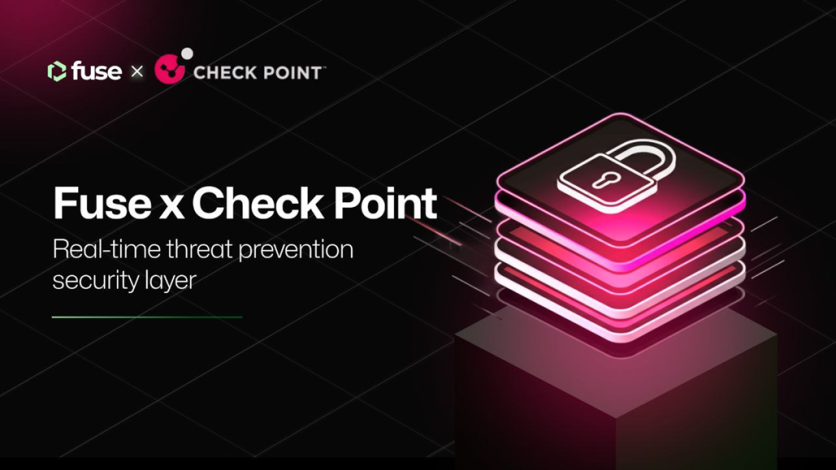
Layer 2 payments suite Fuse announced its partnership with Check Point Software Technologies Ltd., a long-serving cybersecurity firm, to deploy the first advanced blockchain firewall, protecting transactional threats before they happen. This introduces the first-of-its-kind AI-powered threat prevention layer for blockchains. According to the team statement, the partnership will see Check Point Software help secure smart contracts and wallets for Fuse customers, preventing any AI-powered cyber attacks during transactions.
Fuse, a Layer 2 payment solution that provides a customizable suite of financial products to businesses and Web3 users, will leverage the technology from Check Point Software to advance their security and integrate the best-in-class security layer on its blockchain.
Fuse CEO Mark Smargon believes the partnership will be the cornerstone to creating a "gold standard in protecting Web 3 protocols," especially following the recent Bybit Exchange hack that saw over $1.5 billion nabbed by hackers.
"Prevention is always better than a cure, particularly with crypto networks that serve as the backbone for global payments," Smargon said. "With Check Point providing a dedicated security layer, we're confident that we can not only deter hackers, who are becoming increasingly sophisticated, but pioneer a cybersecurity model that will become the gold standard for protecting web3 protocols."
'Protecting The Omnichain'
The partnership is also in line with Fuse's goal of providing high-level security and preventing hacks and other incidents that are a constant threat across the omnichain landscape. By partnering with one of the leading AI-powered, cloud-delivered cybersecurity platforms, Fuse will furnish its blockchain with an advanced security layer that can identify and mitigate threats before they have had a chance to develop, moving blockchain defense from detection to real-time prevention.
In addition, the strategic collaboration will foster a safer ecosystem for all payments, businesses and users, as well as developers, on Fuse. This can be a crucial factor in boosting the adoption of global Web3 payments, accelerating mainstream crypto payments for B2B and B2C applications.
Check Point Software's technology not only ensures advanced security for the blockchain but also prevents malicious transactions in real time, leveraging advanced AI-powered threat engines that draw from more than 30 years of global cyber intelligence.
"We're proud to partner with Fuse and bring Check Point's real-time threat prevention to Web3. By applying our leading threat intelligence, we're setting a new standard for blockchain security—protecting users, wallets, and dApps," says Dan Danay, Head of Web 3.0 Security at Check Point Software Technologies. "Just as robust cybersecurity powered the rise of Web 2.0, real-time prevention will be key to Web3's mainstream adoption."
Evolving Web3 Security Through Firewalls
As a champion for firewall technology in the Web 2.0 landscape, Check Point Software is delving deeper into the Web3 space to revolutionize how payments and transactions work by tackling the most critical pitfall—security. The partnership will focus on smart contract audits and extend to real-time threat detection and prevention to enhance security.
The integration will offer comprehensive protection across the entire network, reinforcing Fuse's commitment to safeguarding user funds and trust while establishing new standards for blockchain security infrastructure. Notwithstanding, the partnership will support Fuse in its quest to become the preeminent Web3 network for stablecoin payments. In the process, it will champion better blockchain security for all users across its ecosystem.
The latest partnership announcement follows the recent launch of Ember Nodes by Fuse, which aims to increase security and boost transaction speeds across the blockchain. Launched with support from leading partners such as Collider Ventures, Tectona, Spark, TRGC, and Blockchain Founders Fund, the Ember Nodes will also allow holders to earn a share of the ecosystem fees and early adopters' incentives. These nodes have attracted broad community support, giving users an opportunity to acquire nodes and participate in network governance and validation.
ⓒ 2025 TECHTIMES.com All rights reserved. Do not reproduce without permission.




